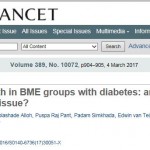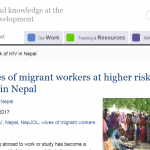 Last week saw the publication of the latest paper by Faculty of Health & Social Sciences (FHSS) staff. This paper ‘Identifying the gaps in Nepalese migrant workers’ health and well-being: a review of the literature’ was co-authored by BU’s Dr. Pramod Regmi and Prof. Edwin van Teijlingen [1]. The authors argue that the health and well-being of migrant workers from low-income countries is often neglected in travel medicine. This article uses Nepal as a case study to highlight key issues affecting this particular group of international travellers.
Last week saw the publication of the latest paper by Faculty of Health & Social Sciences (FHSS) staff. This paper ‘Identifying the gaps in Nepalese migrant workers’ health and well-being: a review of the literature’ was co-authored by BU’s Dr. Pramod Regmi and Prof. Edwin van Teijlingen [1]. The authors argue that the health and well-being of migrant workers from low-income countries is often neglected in travel medicine. This article uses Nepal as a case study to highlight key issues affecting this particular group of international travellers.
Migrant workers who are generally healthy appear to be similar to tourist travellers in regarding sexual health as a key issue related to being abroad. Risky sexual behaviour increases in individuals separated from their usual sexual partners, away from their own communities and families, leading to the so-called ‘situational disinhibition’. Considering the recent media coverage of deaths and injuries among migrant workers in the Middle East, it is interesting to see that their sexual health is more prevalent in the research literature. This article reminds us that travel medicine should provide more emphasis to the health and well-being of migrant workers as a highly vulnerable group of travellers with additional impact on the health of those left behind.
References;
Simkhada, P.P., Regmi, P.R., van Teijlingen, E., Aryal, N. (2017) Identifying the gaps in Nepalese migrant workers’ health and well-being: a review of the literature J Travel Med 24 (4): DOI: https://doi.org/10.1093/jtm/tax021
 One week: five FHSS publications
One week: five FHSS publications Press release INASP highlights BU research paper
Press release INASP highlights BU research paper Nepali migrant workers in India #GlobalFoL17 presentation in Delhi
Nepali migrant workers in India #GlobalFoL17 presentation in Delhi










 Nursing Research REF Impact in Nepal
Nursing Research REF Impact in Nepal Fourth INRC Symposium: From Clinical Applications to Neuro-Inspired Computation
Fourth INRC Symposium: From Clinical Applications to Neuro-Inspired Computation ESRC Festival of Social Science 2025 – Reflecting back and looking ahead to 2026
ESRC Festival of Social Science 2025 – Reflecting back and looking ahead to 2026 3C Event: Research Culture, Community & Cookies – Tuesday 13 January 10-11am
3C Event: Research Culture, Community & Cookies – Tuesday 13 January 10-11am Dr. Chloe Casey on Sky News
Dr. Chloe Casey on Sky News ECR Funding Open Call: Research Culture & Community Grant – Application Deadline Friday 12 December
ECR Funding Open Call: Research Culture & Community Grant – Application Deadline Friday 12 December MSCA Postdoctoral Fellowships 2025 Call
MSCA Postdoctoral Fellowships 2025 Call ERC Advanced Grant 2025 Webinar
ERC Advanced Grant 2025 Webinar Horizon Europe Work Programme 2025 Published
Horizon Europe Work Programme 2025 Published Update on UKRO services
Update on UKRO services European research project exploring use of ‘virtual twins’ to better manage metabolic associated fatty liver disease
European research project exploring use of ‘virtual twins’ to better manage metabolic associated fatty liver disease